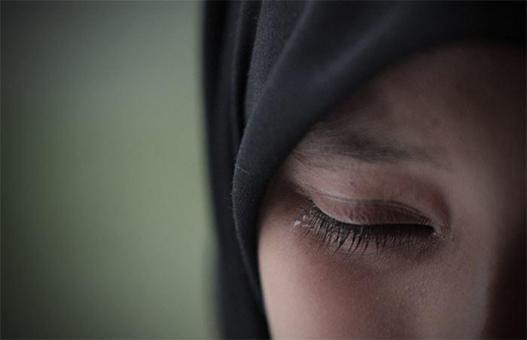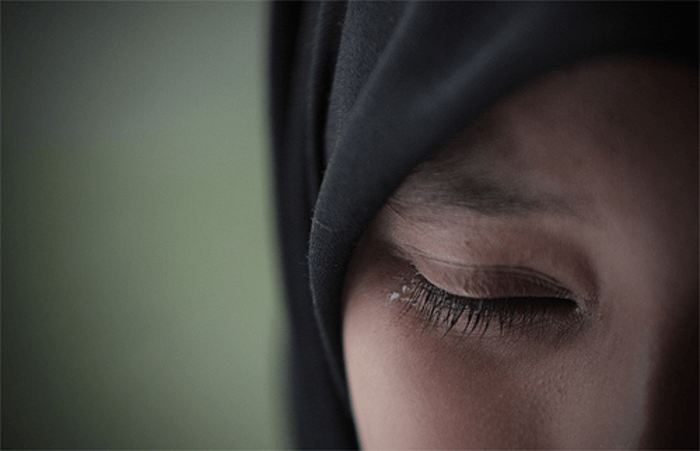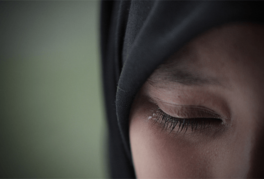
As Huda became aware of her surroundings as she slowly regained consciousness while lying on the floor. She could taste the blood in her mouth and the cold hard tile beneath her. The thundering sound of her abusive husband, yelling and cursing at her, became disturbingly clear and his menacing image slowly came into focus. Fear filled her heart that he may strike again. Her trembling body felt so weak, helpless and vulnerable. He ruthlessly kicked her in her gut one last, fatal blow. Huda and her unborn baby girl were pronounced dead later that evening after surviving 6 months of brutality and domestic violence while in the womb.
There are millions of desperate women like Huda who live with domestic violence their life in constant terror, feeling trapped and unworthy of love. Many of them suffer silently, too immobilized by fear and too consumed with shame to expose their husbands.
Domestic violence transcends socioeconomic status, affecting all levels of income, education, ethnicity, religion and occupation. This tragedy poisons our societies worldwide. The first simple and necessary step is awareness.
Shocking Statistics:
- 2,000 to 4,000 women are beaten to DEATH annually in the U.S.
- According to the Center for Disease over 300,000 PREGNANT WOMEN report suffering abuse during pregnancy.1
- Every day, at least three women are killed in the U.S. by their partners.2
- Nearly 6 million women will be battered in any single year.
- Battery is the SINGLE MAJOR CAUSE of injury to women exceeding street rape, muggings or auto accidents.
- In the United States, a woman’s chances of being assaulted at home by her partner are higher than a police officer’s chances of being assaulted on the job.
Domestic violence has the same impact on women’s psychological and emotional well-being as a tsunami does on a metropolitan city, causing massive destruction and unprecedented devastation. Broken bones and superficial bruises may catch our eye. On the other hand, deep emotional scars last much longer and should elicit the same level of sympathy. Clearing the emotional debris will take years, resulting in emotional bankruptcy and vulnerability, which can lead to suicide. The ferocious waves of violence cause a series of long lasting, psychological damages:

Depression
Domestic violence floods women with feelings of sadness, hopelessness and despair which generally lead to depression. 60% of battered women reported having depression which is the most common symptom of domestic violence.3 Depression is a mood disorder in which feelings of sadness, loss, anger, or frustration interfere with everyday life for weeks or longer. Sadness affects every aspect of life: thoughts, feelings, sleeping, eating, physical health, relationships and the ability to function at work. When victims experience interpersonal violence from a spouse or family member, they are at high risk for mental and emotional illnesses. When abused by someone who should be protecting and nurturing them, they experience a strong sense of abandonment, betrayal, and instability.
Although it is natural to feel sad when faced with difficult tests, as a believer, it is critical to recognize that everything happens for a reason. To understand and accept divine destiny does not imply tolerating abuse in any way. It simply means that life is full of challenges and that trust must be placed in Allah while seeking the best solutions.
Suhayb related that the Prophet of Allah (peace and blessings of Allah be upon him) said, “How excellent is the condition of the believer, for all his affairs are good. If something good happens to him, he expresses gratitude and is rewarded; if something bad happens to him, he bears it patiently and is also rewarded.” Muslim narrates (2999).
Do not despair of solace from Allah. No one despairs of solace from Allah except for people who do not believe. (Surah Yusuf 87)
Post Traumatic Stress Disorder (PTSD)
After the devastation of domestic violence, most women experience the aftershock of abuse: Post Traumatic Stress Disorder (PTSD). PTSD is a type of anxiety disorder which can occur after you’ve seen or experienced a traumatic event that involved the threat of injury or death. It is very common for victims of domestic violence to continue to fear their spouse even if they have separated. PTSD is characterized by symptoms such as flashbacks, intrusive imagery, nightmares, anxiety, emotional numbing, insomnia, hyper-vigilance and avoidance of traumatic triggers. There are many factors that affect the intensity of PTSD: severity of the violence, the duration of exposure, early-age onset and the victim’s cognitive assessment of the violence (perceived degree of threat, predictability and control-ability).
The way to cope with any form of anxiety is turning to Allah and trusting His plan while striving hard to overcome the fear.
The Prophet (peace and blessings of Allah be upon him) said: “No exhaustion, pain, anxiety, grief, harm or distress befalls a Muslim, not even a thorn that pricks him, but Allah will expiate some of his sins with them.” Narrated by al-Bukhaari (5318) and Muslim (2573).
Anxiety
Fear and anxiety consume a victim of domestic violence the way a tidal wave engulfs a city. The fear lingers in a woman’s psyche long after the abuse has taken place. This anxiety can prevent her from concentrating, falling asleep and performing at home or work. Paranoia and inability to trust others are the most frequent traits of the victims of domestic violence. 25 million Americans suffer from anxiety disorders which are the most common of emotional disorders. Some of the symptoms may include:
- Overwhelming feelings of panic and fear
- Uncontrollable obsessive thoughts
- Painful, intrusive memories
- Recurring nightmares
- Physical symptoms such as feeling sick to your stomach, “butterflies” in your stomach, heart pounding, startling easily and muscle tension
Remember that the most beloved people, the prophets, were the most tested. It is essential to keep the stories of the prophets in mind and recall that instead of feeling anxious when faced with threat, oppression and harm, they put their trust in Allah.
We will test you with a certain amount of fear and hunger and loss of wealth and life and fruits. But give good news to the steadfast (Surat al-Baqara, 155)
“Those who believe, and whose hearts find satisfaction in the remembrance of Allah: Without a doubt in the remembrance of Allah do hearts find satisfaction. (Al-Raad 28)
Low Self-Esteem: Domestic Violence Awareness
Verbal and emotional abuse are like earthquakes that brutally shake the foundation of a woman’s self-esteem. They shatter her self- confidence, tear down her sense of security and destroy her self-respect . Each degrading remark, criticism and profanity is like a bulldozer that vehemently annihilates her sense of self-worth. The deep, emotional, and psychological scars left by the cursing, name-calling, and humiliation will disable her from reaching her full potential, nurturing her children, and attaining peace. She becomes so crippled emotionally that it is next to impossible to leave.
Domestic Abuse and Suicide
Like the victims of natural disasters that discover they have nothing left to live for, victims of domestic violence feel so overwhelmed with grief and hopelessness that many attempt suicide. The feeling of helplessness and hopelessness that many victims fall prey to has a profoundly undermining effect on their mental and emotional well being.4 Many times these women simply give up on life and they experience learned helplessness where they lose the will to live. Here are some of the signs of suicide contemplation:
- Talking about killing or harming one’s self
- Expressing strong feelings of hopelessness or being trapped
- An unusual preoccupation with death or dying
- Acting recklessly, as if they have a death wish (e.g. speeding through red lights)
- Calling or visiting people to say goodbye
- Getting affairs in order (giving away prized possessions, tying up loose ends)
- Saying things like “Everyone would be better off without me” or “I want out.”
If you think a friend or family member is considering suicide, express your concern and seek professional help immediately. Talking openly about suicidal thoughts and feelings can save a life.6
See Suicide Prevention: Signs of Suicide and How to Help a Suicidal Person.
The problems and difficulties that people endure are temporary and known. Compare that to being faced with the unknown punishment in the hereafter for committing suicide for all eternity.
O you who have believed, do not consume one another’s wealth unjustly but only [in lawful] business by mutual consent. And do not kill yourselves [or one another]. Indeed, Allah is to you ever Merciful. 4:29
After a psychological tsunami that ruthlessly destroys feelings of self-worth and security, there needs to be massive action taken to recover from the lasting damages. The first step is to clean up the emotional debris and the shattered feelings. Time and money needs to be invested to establish self-worth. If the amount of damage is overwhelming, seek the support and guidance of professionals to overcome the devastation. Next, focused effort needs to be put in rebuilding self-esteem. By not internalizing the negative, destructive comments of others and re-confirming all positive traits, self-respect and dignity will be rebuilt. Trust in the self and in others will be essential in creating a strong foundation for developing lasting relationships. Perhaps the most important aspect of recovery is to gain hope in the future. Once the fire of hope is ignited it will shine so brightly and provide the necessary motivation to overcome all obstacles and to help others facing the same challenges.
If you or someone you know is a VICTIM of abuse know:
- You are NOT ALONE
- There are avenues for HELP
- Ensure the SAFETY of you and your children
- You are a VALUABLE person who is worthy of love
- It is NEVER ACCEPTABLE to be physically, verbally or emotionally abused
Narrated Abu Ma’bad, that the Prophet said, “… and be afraid of the supplication of an oppressed person because there is no screen between his invocation and Allah.” Sahih Bukhari: Volume 2, Book 24, Number 573.
What to do if you or someone you know is the ABUSER:
- Seek professional help to FOR ANGER MANAGEMENT
- It is not too late to CHANGE YOURSELF and CHANGE YOUR LIFE
- Find an OUTLET (sport or other activity) to release stress and frustration
- Seek the SUPPORT of family and friends
- REAL MEN DON’T ABUSE!
“Help your brother, whether he is an oppressor or he is oppressed.” The Prophet was asked: “It is right to help him if he is oppressed, but how should we help him if he is an oppressor?” He replied: “By preventing him from oppressing others.” Sahih Bukhari, Volume 3, Hadith 624
References:
- Domestic violence hotline links and resources: If you are in a life threatening situation or if you or any other person may be in danger – DON’T use this website. Use These resources to get immediate help.
- http://www.womensweb.ca/violence/dv/pregnancy.php
- Types of Trauma: Domestic Violence – San Francisco depression | Examiner.com http://www.examiner.com/depression-in-san-francisco/types-of-trauma-domestic-violence#ixzz1ZstUJQB9
- http://www.aardvarc.org/dv/effects.shtml
- Types of Trauma: Domestic Violence – San Francisco depression | Examiner.com http://www.examiner.com/depression-in-san-francisco/types-of-trauma-domestic-violence#ixzz1Zsu4uQTE
- http://www.examiner.com/depression-in-san-francisco/types-of-trauma-domestic-violence
- Suicide Prevention: Signs of Suicide and How to Help a Suicidal Person






0 Comments